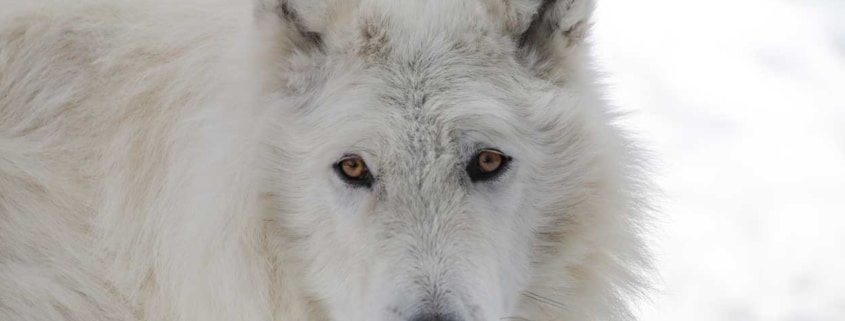Exhibit Pack Update – 18 May 2024
Axel, a nearly eight-year-old arctic wolf with a bright white coat and an excitable personality, was euthanized in April. He was a popular ambassador at the International Wolf Center, teaching thousands of visitors about wolf behaviors and adaptations.
On Friday morning, April 19, wolf care staff reviewed security camera footage and observed Axel having a seizure. He was moved to the retirement enclosure, which allowed staff to closely monitor him 24 hours a day.
On Saturday night, he exhibited a few behaviors that led staff to conclude he was feeling worse, but he still kept eating and consistently greeted the wolf care team.
The Center’s veterinarian, Dr. Kristine Woerheide, was consulted and helped develop a plan for a blood draw so lab work could be completed at the nearby Ely Veterinary Clinic in Ely, Minnesota. Unfortunately, the lab work confirmed that Axel was in severe kidney failure. The effects of extreme kidney failure likely contributed to his seizures.
After consultation with the wolf care team and Dr. Woerheide, it was agreed that because of Axel’s complex medical condition, the irreversible kidney failure and concerns about his quality of life going forward, humane euthanasia was the only option.
Axel passed away surrounded by his wolf care team.
This was a heartbreaking loss for all of us. We apologize for the delay in YouTube Pack Updates and Exhibit Pack Logs; we hope to get back to a regular schedule this summer. To learn more about Axel and his passing, we recommend watching this YouTube Pack Update that covers things more thoroughly. We also have a free webinar available to watch that celebrates Grayson’s 8th birthday, and honors Axel’s life and legacy here at IWC.
–
Many of you may remember from the past updates that Grayson has been having some rectal issues, specifically straining a lot and having some mucous in his scat. We first noted these issues back in February after seeing him having difficulties defecating and seeing a bit of blood in his stool, later noting some inflammation and irritation of his anus. The wolf care team monitored him closely and noted no other physical or behavioral concerns.
To help sooth any discomfort, the wolf care team applied ointment to his rear as we continued to monitor his defecations. While we would have liked to do a rectal exam on him at that time, it would have required a full chemical immobilization during a time when wolves are still feeling the heightened dominance that comes with winter breeding season hormones. In order to ensure Grayson could be reintroduced into the pack with minimal focus, our best course of action was to wait until things warmed up and the arrival of spring hormones encouraged a calmer pack.
After Retiring and saying goodbye to Axel, we decided it was a good time to immobilize Grayson and get a closer look at his rectum. Wolf Care Staff, along with our vet at the Ely Veterinary Clinic, came up with an immobilization plan to conduct a full medical exam for him, including bloodwork, cleaning up any old scabs, and getting a closer look at what may be causing the irritation of his rear. Everything went incredibly smoothly and we were able to get everything done that we had planned for.
When we separate a more dominant individual like this, we want to make sure they can be integrated back into the pack with as little focus as possible. We had Rieka, Caz, and Blackstone in one of the Retirement enclosures during Grayson’s exam and recovery, so that Grayson was the first wolf back into the Exhibit Pack. We then let Rieka back in with Grayson first, knowing that she would be the most likely to focus on him; this way, Grayson could handle her attentions without the two-year olds adding to the excitement. Grayson still felt some of the affects of the drugs used to immobilize him, but was alert enough to chase her off and defend himself when needed. Once Rieka seemed to lessen her focus on Grayson, we let Caz and Blackstone back into the Exhibit Pack. They were both very submissive and respectful of Grayson, but their excitement brought Rieka back over, as predicted. Wolf care team members remained in the enclosure with the pack to provide distractions and ensure Grayson was given space to fully recover from the drugs.
Fortunately, all of Grayson’s bloodwork came back normal, and our vet did not find any masses or tumors in his rectum, just some herniated tissue and edema. She collected a tissue sample of the area, which confirmed a diagnosis of colitis and chronic inflammation of the rectum. He is currently on an antibiotic and a probiotic that are specific for gastrointestinal health. Since the start of his treatment, we have seen significant progress in the health of the tissue. His scats have been more normal and his anus is not longer as visibly inflamed. The swelling has receded and tissue is no longer herniated.
It is also important to note that during this entire time, his behaviors remained typical and status in the pack has not lessened. In fact, Grayson appears to have gained quite a bit of confidence after Axel’s passing. We oftentimes see him posture over Caz and maintain the respect of the younger males. Rieka will still grab at his tail during times of high intensity or excitement, but Grayson has been more willing to chase her off and engage with her in social behaviors.
We will continue to monitor his health closely and keep everyone up to date with what has been going on in the pack.




